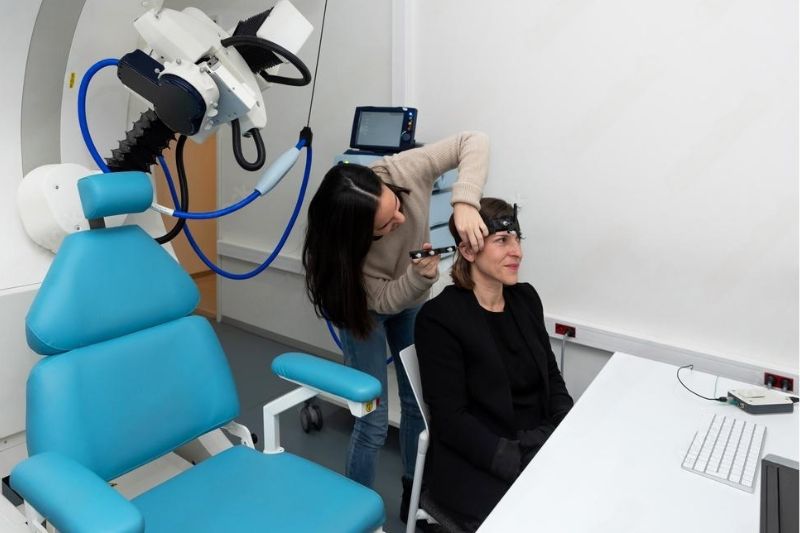At McMonigle Neurology Associates, we offer Transcranial Magnetic Stimulation (TMS)—a cutting-edge, non-invasive treatment that uses magnetic pulses to activate specific areas of the brain. Originally developed for depression, TMS has now shown incredible potential for a wide range of mental health and neurological conditions, offering hope when traditional treatments may not have worked.
TMS therapy is an FDA-approved procedure that stimulates targeted brain regions using gentle magnetic fields.

By encouraging the brain to form new connections and improve communication between nerve cells, TMS helps restore healthier brain function. Unlike medications, it does not require anesthesia, has no systemic side effects, and allows patients to return to daily activities immediately after each session.
While TMS for depression remains its most well-known application, research and clinical use have expanded to include a variety of conditions:
1. Major Depressive Disorder (MDD)
TMS directly targets the prefrontal cortex—an area of the brain linked to mood regulation—helping reduce symptoms of depression, even in cases resistant to medication.
2. Obsessive-Compulsive Disorder (OCD)
TMS has been shown to help calm overactive brain circuits that trigger repetitive thoughts and compulsive behaviors.
3. Post-Traumatic Stress Disorder (PTSD)
By regulating brain pathways involved in fear and stress responses, TMS may ease intrusive memories, hypervigilance, and anxiety associated with trauma.
4. Generalized Anxiety Disorder (GAD)
TMS can help reduce overactivity in regions of the brain linked to worry and panic, providing a calmer mental state.
5. Neurological & Movement Disorders
Early studies suggest TMS may aid in improving motor function and reducing symptoms in conditions such as Parkinson’s disease and post-stroke recovery.
During each Transcranial magnetic stimulation (TMS) session, the patient is seated comfortably. A small electromagnetic coil is positioned against their scalp, near the area of the brain associated with pain processing. The non-invasive nature of TMS means that no anesthesia is required, and the procedure is typically painless.
Non-Invasive & Drug-Free: No surgery, no anesthesia, and no long recovery time.
Minimal Side Effects: Most patients experience only mild scalp discomfort that fades quickly.
Evidence-Based Results: Backed by scientific research and years of clinical success.
Personalized Treatment Plans: Tailored to your unique symptoms and health history.
Your TMS journey at McMonigle Neurology Associates begins with a comprehensive evaluation to ensure this therapy is right for you. During each session:
- You will be comfortably seated in a treatment chair.
- A specialized TMS device will be placed near your head.
- Magnetic pulses will stimulate targeted brain areas for 20–40 minutes.
- You can resume normal activities immediately afterward—no downtime required.
Why Choose McMonigle Neurology Associates for TMS?
Specialized Expertise: Our team is trained in advanced neuromodulation techniques to ensure the best possible outcomes.
Compassionate Care: We focus on understanding your goals, concerns, and progress every step of the way.
State-of-the-Art Technology: We use the latest TMS devices for precision, comfort, and effectiveness.
Start Your Journey Toward a Healthier Mind
If you are struggling with depression, anxiety, OCD, PTSD, or another condition that has not improved with medication alone, TMS therapy may be the breakthrough you’ve been looking for. At McMonigle Neurology Associates, we are dedicated to helping you regain control of your mental health and live a more fulfilling life.
Contact us today to schedule your TMS consultation and take the first step toward long-term relief.

Transcranial Magnetic Stimulation Therapy
Transcranial Magnetic Stimulation involves a series of sessions specifically designed to alleviate chronic pain.

Transcranial Magnetic Stimulation Therapy
Effective chronic pain treatment, Transcranial Magnetic Stimulation (TMS) as groundbreaking and innovative option.

Transcranial Magnetic Stimulation Therapy
This article examines potential of Transcranial Magnetic Stimulation (TMS) in managing chronic pain.

Transcranial Magnetic Stimulation Therapy
Understanding Chronic Pain and Exploring Role of Transcranial Magnetic Stimulation (TMS.
